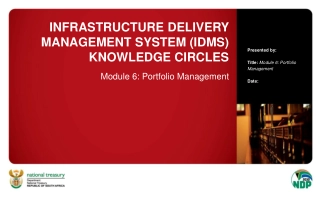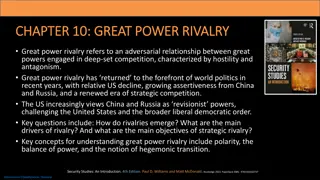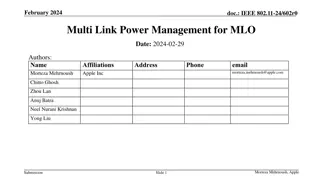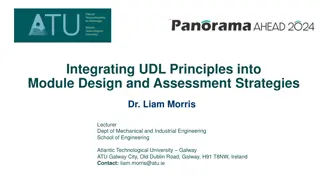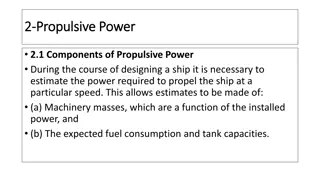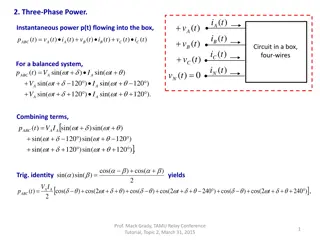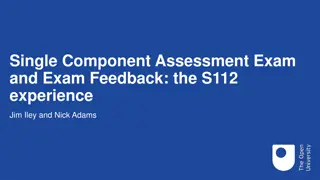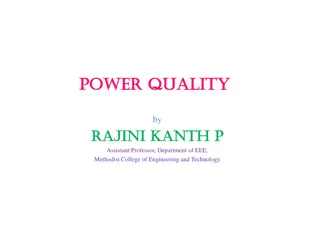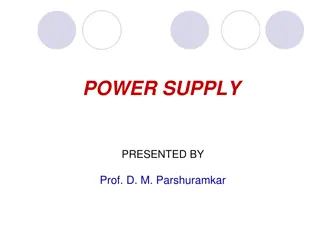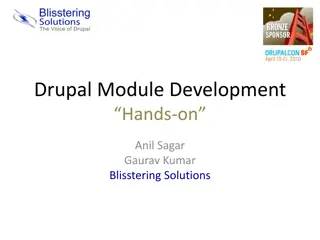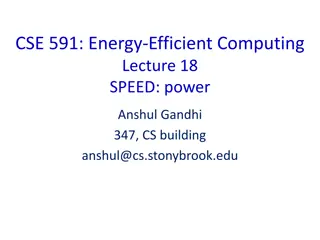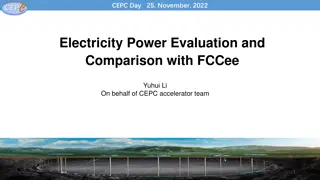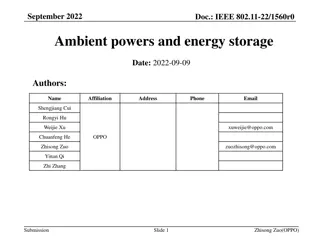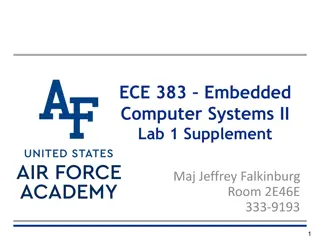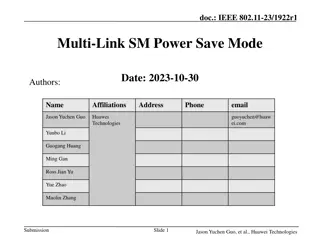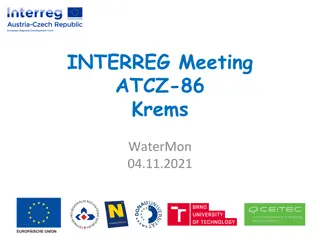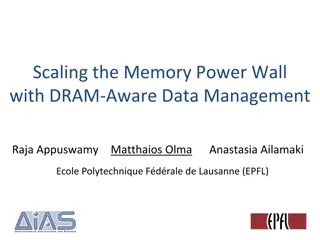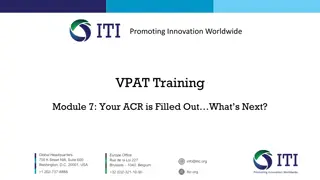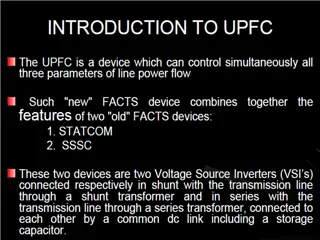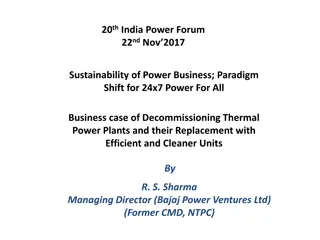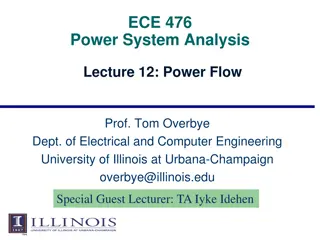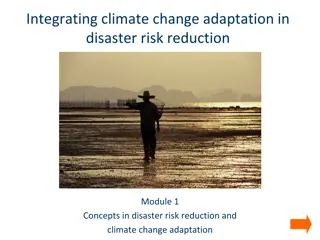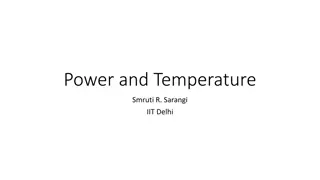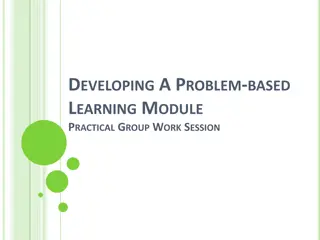Infrastructure Delivery Management System (IDMS) Knowledge Circles Module 6: Portfolio Management
This module delves into the concept of Infrastructure Delivery Management (IDM) within the context of South African organs of state. It outlines the processes and procedures necessary for implementing IDM, focusing on portfolio management as the initial step in a series of four delivery management m
3 views • 36 slides
Cisco Systems Fault Managed Power Portfolio Overview
Cisco Systems offers an industry-leading Fault Managed Power (FMP) patent portfolio comprising 24 active assets across seven INPADOC families. The portfolio includes patents supporting fault-managed power systems, PoE deployments, DC power distribution, DC-DC conversion, and HVDC connectors. The FMP
4 views • 4 slides
Power Distribution in Data Centers Overview
Power distribution and equipment play crucial roles in commercial data center infrastructure, ensuring reliable and efficient operations. Adequate power routing from the grid or generators to data center equipment is vital for stable operations, data integrity, and performance maintenance. This incl
4 views • 19 slides
Great Power Rivalry in World Politics: Understanding Polarity, Balance of Power, and Hegemonic Transition
Great power rivalry involves deep competition and hostility between major players like the US, China, and Russia. The concept is explored through polarity, balance of power, and hegemonic transition theories, discussing power distribution, strategies, and transitions in the international system. The
4 views • 12 slides
Improving Multi-Link Power Management Efficiency in IEEE 802.11 Networks
The document discusses challenges with per-link power mode changes in multi-link scenarios in IEEE 802.11 networks, proposing a solution for more efficient power management. It addresses issues such as latency and inefficiencies in signaling for power mode changes, introducing scheduled multi-link p
6 views • 9 slides
Understanding Power Transfer and Impedance Matching in Circuits
Exploring the concept of maximizing power transfer between a source and load through impedance matching. Learn about complex conjugates, real and magnitude of complex numbers, average power in circuits, and the importance of minimizing reflected power. Discover how incident, reflected, and delivered
3 views • 33 slides
Tour Module
Travelopro's Tour module is a one-stop solution for managing a tour business and grow your tour business. Our tour module covers many types of businesses. Our reservation software has made it possible to reserve tours, along with all their criteria, including tickets, hotels, visas, services, and to
4 views • 15 slides
Hotel Module
Discover Travelopro's cutting-edge Hotel Module. Elevate your hospitality experience with our tailored services, designed for hotels of all sizes. The Hotel Module is developed to cater to the needs of the hotel industry. The Hotel Module enables you
2 views • 15 slides
Enhancing Module Design through UDL Principles by Dr. Liam Morris
Dr. Liam Morris, a lecturer at Atlantic Technological University, explores the integration of Universal Design for Learning (UDL) principles into module design and assessment strategies. His focus is on enhancing transparency, ensuring equity, and promoting further improvements in teaching practices
0 views • 7 slides
Understanding Ship Propulsion Power Estimation
In the process of ship design, it is crucial to estimate the power required for propulsion to determine machinery masses, fuel consumption, and tank capacities. Power estimates can be derived through comparisons with existing vessels or model tests, involving scaling laws for different components. S
0 views • 19 slides
Overview of Farm Power Sources and Utilization in Agriculture
Farm power sources in agriculture include human, animal, mechanical, and renewable energy. Human power is costly but versatile, while animal power is traditional and provides manure. Mechanical power from tractors and engines is efficient. India's farm power sources reflect a mix of traditional and
0 views • 12 slides
Understanding Three-Phase Power Systems and Instantaneous Power Flow
This detailed content delves into three-phase power systems, analyzing instantaneous power flow, balanced circuits, and trigonometric calculations. It explores the concept of constant three-phase power and provides insights into the analogy of a piston engine with infinite cylinders. The data includ
2 views • 9 slides
Power Transmission and Distribution Network of Tunnel Boring Machine Site
The power transmission and distribution network at the tunnel boring machine (TBM) site involves electrical motors, generators, transformers, and power cables to efficiently operate TBMs for tunnel construction. The system includes multiple generators, transformers, junction boxes, and power distrib
1 views • 7 slides
Teaching Mental Wellbeing in Health Education: Training Module Overview
This training module provides valuable insights into teaching mental wellbeing as part of health education in primary and secondary schools. It covers the new curriculum requirements, examples of good practices, and activities for trainers. Schools are encouraged to adapt the module according to the
3 views • 62 slides
Understanding Thermal Power Plants: Overview and Operation
Thermal power plants play a crucial role in converting heat energy into electricity for various applications. This article covers the definition, layout, working principle, and components of thermal power plants, highlighting their advantages and top features. From converting heat into mechanical po
0 views • 20 slides
Analysis of Single Component Assessment Exam Feedback for S112 Module
The assessment strategy for the S112 module involves a single exam component alongside several TMAs. Findings show little gaming of the system, with most students submitting assignments. Exam performance correlates with the number of assignments submitted. The outcome of the module seems to be affec
1 views • 27 slides
Scholarly Project Module in MBBS Year 3 Overview
Scholarly Project Module (SPM) in MBBS Year 3 is a pivotal module focusing on developing students into doctors as scholars and scientists. It includes a project-based approach, essential skills development, and assessments like a 3000-word essay. The module runs in the first semester and covers vari
0 views • 11 slides
Understanding Power Quality and Its Impact on Electrical Systems
Power quality refers to the characteristics of electrical power that drives sensitive equipment. It involves voltage and current deviations from ideal waveforms, impacting the efficiency and reliability of electrical systems. Various types of power quality phenomena exist, such as voltage variations
1 views • 16 slides
Understanding Power Supplies and Rectifiers in Electrical Systems
Power supplies play a crucial role in converting AC power to DC power, with two main types being unregulated and regulated. Regulated power supplies consist of essential components like a step-down transformer, full-wave rectifier, filter circuit, and voltage-regulating circuit. Rectifiers are devic
0 views • 25 slides
A Comprehensive Guide to T-TRAK Modular Model Railroad System
Delve into the world of T-TRAK modular model railroads with this detailed guide covering aspects like module construction standards, layout types, benefits, and various construction options. Explore the compact size, collaborative nature, and creative possibilities offered by T-TRAK for enthusiasts.
0 views • 32 slides
Hands-On Drupal Module Development Guide
Unleash your potential with this comprehensive guide on Drupal module development. Explore Drupal architecture, database structures, module types, and hands-on tweet scope. Dive into module architecture, hook implementation, form API, permissions, schema API, and more. Enhance your skills in modifyi
0 views • 86 slides
Helicopter Power Management Guidelines
Understanding the factors that can lead to power required exceeding power available in a helicopter is crucial for safe operation. Indications such as uncommanded descent, rotor droop, loss of tail rotor authority, and right yaw signal potential issues to watch out for. Knowing when such occurrences
0 views • 11 slides
Exploring Power Efficiency in Computing Systems
In this lecture series on energy-efficient computing, various concepts related to dynamic frequency scaling, power capping, power shifting, power modeling, and power measurement are discussed. The impact of power on server speed is explored, alongside strategies for improving performance within powe
0 views • 17 slides
Comparison of Electricity Power Systems Between CEPC and FCCee
The evaluation and comparison of electricity power systems between the CEPC and FCCee accelerators reveal the power breakdowns, RF power consumption, magnet power supply, and overall power usage. Differences in power consumption for various components such as RF, magnets, and vacuum systems are high
0 views • 19 slides
Ambient Power Harvesting Technologies Overview
This document discusses various ambient power harvesting technologies such as RF energy, solar power, light, and thermal energy. RF-based energy harvesting utilizes radio waves for power transmission with potential applications in logistics, smart homes, and environmental monitoring. Solar power off
0 views • 12 slides
IndustriALL Training on Gender-based Violence and Harassment Modules Overview
IndustriALL provides training on gender-based violence and harassment in the workplace through Modules 1-3. Module 1 covers the introduction to gender-based violence definitions and impacts, aiming to address risk factors, understand definitions, and build union capacity to prevent and address the i
0 views • 71 slides
Power Quality Monitoring and Evaluation in Modern Energy Systems
Power quality is crucial for stable operations in energy systems. This content discusses issues in power supply, reasons for measuring power quality, consequences of bad power quality, methods for measuring power quality, and evaluation techniques for compliance reports. Tracking power quality param
0 views • 21 slides
Embedded Computer Systems Lab 1: VGA Module Overview
This document provides an overview of Lab 1 for Embedded Computer Systems II, focusing on the VGA module and its functionalities. It includes details about the VGA module entity, its ports, clock signals, trigger voltage and time representation, channel signals, color intensities, row and column val
0 views • 18 slides
Power Dynamics in the Hellenistic World: A Study of Olympias of Macedon
Exploration of power dynamics in the Hellenistic world through the multidimensional exercise of power by Olympias of Macedon. The study delves into various forms of power such as reward, coercive, legitimate, referent, and expert power, shedding light on their roles in shaping leadership and influen
0 views • 20 slides
Enhancing Power Efficiency in IEEE 802.11 Multi-Link SM Power Save Mode
The document discusses how Multi-Link Operation (MLO) in IEEE 802.11be can improve throughput and reduce latency but may increase power consumption for non-AP devices. It introduces the concept of Multi-Link SM Power Save mode to optimize power usage by activating multiple links only when necessary,
0 views • 10 slides
Electrochemical Sensing Module Overview and Potentiostat Parameters
In this meeting, the Electrochemical Sensing Module based on the EmStat-pico potentiostat was discussed. The module features precise, low-power control unit Arduino MKR Zero and supports techniques such as voltammetry and EIS. Potentiostat parameters include a full dc-potential range, EIS frequency
0 views • 16 slides
Understanding Power Consumption in Memory-Intensive Databases
This collection of research delves into the power challenges faced by memory-intensive databases (MMDBs) and explores strategies for reducing DRAM power draw. Topics covered include the impact of hardware features on power consumption, experimental setups for analyzing power breakdown, and the effec
0 views • 13 slides
Understanding the ACR Process for VPAT Training Module 7
In this VPAT training module 7, you will learn what to do once the ACR (Accessibility Conformance Report) is filled out and what steps to take next. This module covers the goals of module 7, upcoming VPAT changes, ACR format delivery options, accessibility testing, publishing the ACR, ensuring an ac
0 views • 11 slides
Overview of Unified Power Flow Controller (UPFC) in Power Systems
A Unified Power Flow Controller (UPFC) is a combination of a Static Synchronous Compensator (STATCOM) and a Static Synchronous Series Compensator (SSSC) interconnected via a common DC link. UPFC allows bidirectional flow of real power and provides concurrent real and reactive series line compensatio
0 views • 20 slides
Understanding Leadership and Power Dynamics
Power and leadership are interconnected concepts, with power being the measure of a person's ability to influence others. Leaders have power in various situations, but it does not necessarily mean having power over people. Effective leaders balance their use of power with knowledge and trust, knowin
0 views • 9 slides
Discussion on Sustainable Energy Solutions and Efficiency Improvements in Thermal Power Plants
The 20th India Power Forum held on 22nd November 2017 highlighted the importance of sustainability in the power business, focusing on the paradigm shift towards 24x7 power for all. Topics included decommissioning thermal power plants for more efficient and cleaner units, with insights from industry
0 views • 16 slides
Power System Analysis: Lecture on Power Flow
Lecture 12 on Power Flow Analysis in Power Systems covers the use of power balance equations when analyzing complex power consumption and generation. It explains the derivation of real power balance equations for iterative solutions in power flow analysis. The lecture highlights the need for iterati
0 views • 30 slides
Integrating Climate Change Adaptation in Disaster Risk Reduction Module 1
Welcome to the e-Learning module on integrating climate change adaptation in disaster risk reduction. This module covers concepts in disaster risk reduction and climate change adaptation. It is part of a package that includes five modules focusing on vulnerability, disaster risk reduction, climate c
0 views • 29 slides
Understanding Power Consumption and Temperature in Electronic Circuits
Explore the significance of power consumption in electronic circuits, focusing on reasons for high power, high temperature, and low reliability. Learn about sources of power consumption, types of power dissipation, dynamic power analysis, and the relationship between energy and power in circuits.
0 views • 30 slides
Designing a Problem-Based Learning Module for Sustainability Champion Program
Vice-chancellor mandates academic departments to integrate a sustainability-themed module. Your team is tasked with designing a 12-week module focusing on sustainability and transferable skills. Choose a scenario, incorporate technology, develop key skills, plan assessments, and address challenges f
0 views • 6 slides
